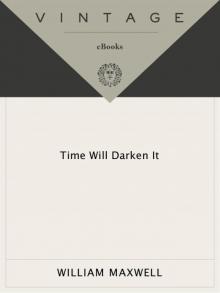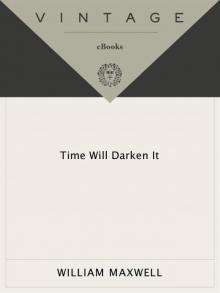- Home
- William Maxwell
Time Will Darken It Time Will Darken It
Time Will Darken It Time Will Darken It Read online
Acclaim for
William Maxwell
“He has a magic way with words.… Among the past half-century’s few unmistakably great novelists.”
—Village Voice
“Maxwell’s [fiction] honors the physical world with verisimilitude, human experience with emotional fidelity and the English language with consummate craft.”
—Wall Street Journal
“No comparison does Maxwell justice.… [In] his fictional worlds we often encounter an intimacy so intense it literally gives us goose bumps.”
—Cleveland Plain Dealer
“He holds an almost legendary place in the American literary world.”
—Newsday
“Maxwell has so cool and sharp an eye … a wise observer of ordinary human behavior … a writer of impeccable English prose.”
—Washington Post Book World
“Mr. Maxwell writes with such clear-eyed sympathy for his characters that the reader is constantly made aware of the larger redemptive patterns that subsume their individual problems.”
—The New York Times
“Maxwell is one of our finest writers … and like all great writers he deals in truth: an uncompromising vision of the way we are and why.”
—Houston Chronicle
“One of American literature’s best-kept secrets.”
—New York magazine
“Mr. Maxwell’s work is thoroughly balanced, gentle and humane.… His powers of description are remarkable.”
—The New York Times Book Review
“Rare sensitivity, telling detail and bare, graceful prose.”
—San Francisco Chronicle
“No one else currently writing can capture as Maxwell does a sense of life in the balance, of a moment appreciated.… The beauty of some sentences is like a stab of light.”
—Chicago Tribune
“Maxwell is a novelist intrigued by the nuances of social form and a strongly visual writer fascinated by the way things look and feel.… His work [has grown] into an act of the imagination that can encompass a world of time and thought beyond the immediacy of recollection. By transfiguring the past in the crucible of art, he has held it in trust for the future.”
—New Republic
“His characters are so well drawn you want to know more and more about them. His writing is simple and direct, poignant without being sentimental.”
—Houston Post
William Maxwell
Time Will Darken It
William Maxwell was born in 1908, in Lincoln, Illinois. When he was fourteen, his family moved to Chicago and he continued his education there and at the University of Illinois. After a year of graduate work at Harvard, he went back to Urbana and taught freshman composition, and then turned to writing. He has published six novels, three collections of short fiction, an autobiographical memoir, a collection of literary essays and reviews, and a book for children. For forty years he was a fiction editor at The New Yorker. From 1969 to 1972 he was president of the National Institute of Arts and Letters. He has received the Brandeis Creative Arts Award Medal and, for So Long, See You Tomorrow, the American Book Award and the Howells Medal of the American Academy of Arts and Letters.
Books by William Maxwell
All the Days and Nights: The Collected Stories (1995)
Billie Dyer and Other Stories (1992)
The Outermost Dream (1989)
So Long, See You Tomorrow (1980)
Over by the River and Other Stories (1977)
Ancestors (1971)
The Old Man at the Railroad Crossing and Other Tales (1966)
The Château (1961)
Stories (1956)
(with Jean Stafford, John Cheever, and Daniel Fuchs)
Time Will Darken It (1948)
The Heavenly Tenants (1946)
The Folded Leaf (1945)
They Came Like Swallows (1937)
Bright Center of Heaven (1934)
Copyright © 1948 by William Maxwell
Copyright renewed 1976 by William Maxwell
All rights reserved under International and Pan-American Copyright Conventions. Published in the United States by Vintage Books, a division of Random House, Inc., New York, and simultaneously in Canada by Random House of Canada Limited, Toronto. Originally published in the United States in hardcover by Harper and Brothers, New York, in 1948.
Library of Congress Cataloging-in-Publication Data Maxwell, William,
Time will darken it / by William Maxwell.
p. cm.
eISBN: 978-0-307-49195-4
I. Title.
PS3525.A9464T55 1997
813′.54—dc20 96-25027
The quotation from Francisco Pacheco, translated by Marco Treves, is reprinted from Artists on Art by permission of Pantheon Books Inc.
Random House Web address: http://www.randomhouse.com/
v3.1
for my wife
Contents
Cover
About the Author
Other Books by This Author
Title Page
Copyright
Dedication
Epigraph
Part One - An Evening Party (1912)
Chapter 1
Chapter 2
Chapter 3
Chapter 4
Chapter 5
Chapter 6
Chapter 7
Part Two - A Long Hot Day
Chapter 1
Chapter 2
Chapter 3
Chapter 4
Chapter 5
Chapter 6
Chapter 7
Chapter 8
Chapter 9
Chapter 10
Chapter 11
Part Three - A Serious Mistake
Chapter 1
Chapter 2
Chapter 3
Chapter 4
Chapter 5
Chapter 6
Chapter 7
Chapter 8
Chapter 9
Chapter 10
Chapter 11
Chapter 12
Chapter 13
Chapter 14
Chapter 15
Part Four - The Cruel Chances of Life Baffle Both the Sexes
Chapter 1
Chapter 2
Chapter 3
Chapter 4
Chapter 5
Chapter 6
Chapter 7
Chapter 8
Chapter 9
Chapter 10
Chapter 11
Chapter 12
Chapter 13
Chapter 14
Chapter 15
Chapter 16
Chapter 17
Chapter 18
Chapter 19
Part Five - The Province of Jurisprudence
Chapter 1
Chapter 2
Chapter 3
Chapter 4
Chapter 5
Chapter 6
Chapter 7
Chapter 8
Chapter 9
Chapter 10
Chapter 11
Chapter 12
Chapter 13
Chapter 14
Chapter 15
Chapter 16
Chapter 17
Chapter 18
Chapter 19
Part Six - There Is a Remedy or There Is None
Chapter 1
Chapter 2
Chapter 3
Chapter 4
Chapter 5
Chapter 6
Chapter 7
Chapter 8
Chapter 9
Chapter 10
Chapter 11
Chapter 12
Chapter 13
Chap
ter 14
Chapter 15
Chapter 16
Chapter 17
Chapter 18
Chapter 19
Chapter 20
Chapter 21
The order observed in painting a landscape—once the canvas has been prepared—is as follows: First, one draws it, dividing it into three or four distances or planes. In the foremost, where one places the figure or saint, one draws the largest trees and rocks, proportionate to the scale of the figure. In the second, smaller trees and houses are drawn; in the third yet smaller, and in the fourth, where the mountain ridges meet the sky, one ends with the greatest diminution of all.
The drawing is followed by the blocking out or laying in of colours, which some painters are in the habit of doing in black and white, although I deem it better to execute it directly in colour in order that the smalt may result brighter. If you temper the necessary quantity of pigment—or even more—with linseed or walnut oil and add enough white, you shall produce a bright tint. It must not be dark; on the contrary, it must be rather on the light side because time will darken it.…
Once the sky, which is the upper half of the canvas, is done, you proceed to paint the ground, beginning with the mountains bordering on the sky. They will be painted with the lightest smalt-and-white tints, which will be somewhat darker than the horizon, because the ground is always darker than the sky, especially if the sun is on that side. These mountains will have their lights and darks, because it is the custom to put in the lower part—after finishing—some towns and small trees.…
As you get nearer the foreground, the trees and houses shall be painted larger, and if desired they may rise above the horizon.… In this part it is customary to use a practical method in putting in the details, mingling a few dry leaves among the green ones.… And it is very praiseworthy to make the grass on the ground look natural, for this section is nearest the observer.
—FRANCISCO PACHECO (1564–1654)
The quotation from Francisco Pacheco, translated by Marco Treves, is reprinted from Artists on Art by permission of Pantheon Books Inc.
Part One
An Evening Party
(1912)
1
In order to pay off an old debt that someone else had contracted, Austin King had said yes when he knew that he ought to have said no, and now at five o’clock of a July afternoon he saw the grinning face of trouble everywhere he turned. The house was full of strangers from Mississippi; within an hour the friends and neighbours he had invited to an evening party would begin ringing the doorbell; and his wife (whom he loved) was not speaking to him.
As yet this quarrel was confined to the bedroom and he wanted if possible to keep it from spreading through the house. On his way upstairs he fixed the picture of Maxine Elliott so that it was straight with the world. As he closed the bedroom door from the inside, his eyes turned to the mahogany four-poster bed where his wife lay, face down, in a Japanese kimono. Her brown hair was spread out on the pillow like a sea plant, and one arm, with a heavy gold bracelet hanging from the delicate inert wrist, extended past the edge of the bed into space.
Austin loosened his tie and took off his coat and trousers and hung them on a hanger in the closet. When he had put on his bathrobe he stood waiting for some slight movement, some indication that the hand which had so often searched blindly for his hand was ready to make peace. There was no price that he was not willing to pay, no bargain too hard if only for the rest of this day all differences could be put aside, all wounds (old and new) disregarded and left to heal themselves. After a moment he sat down on the edge of the bed. Receiving no encouragement, he waited and then put out his hand. His fingers closed around his wife’s elbow. The elbow was jerked away and drawn under her body where he couldn’t get at it. The childishness of this gesture made him smile, but it also meant that one avenue of reconciliation was closed.
“I’m sorry I did what I did,” he said. “I should have talked to you first, before I wrote and told them to come. And if I had it to do over again——” There was no answer and he knew from past experience that there would be none. “I thought you’d understand and they wouldn’t,” he said.
His eyes rested uneasily on the design of the appliquéd quilt, the round lavender morning glories and the heart-shaped green leaves. The quilt was a present from his mother, who would have been shocked to see anyone lying on it.
Annoyed at himself for thinking about the quilt at a time like this, he crossed the room to the dressing-table, picked up his wife’s hairbrush, and closing the bedroom door behind him, went into the room across the hall to look after his little daughter, who was too young to dress without help. Between them they decided which shoes and stockings, which dress she was to wear, and put them on her. Then, sitting in a rocker that was too low for him, Austin held her chin with one hand and managed the hairbrush inexpertly with the other.
The excitement of guests staying in the house made Abbey King talkative. “Is it true,” she asked, “is it true that gypsies steal little children?”
Though more delicate and with a difference in spacing, her features were a reproduction of her father’s—the high forehead particularly, and the eyebrows and grey-blue eyes. Her hair was light brown, like her mother’s, and straight. When it was being brushed, it fluffed out and made crackling sounds but Ab knew, at four years old, that her hair was too fine and too thin to be admired. Both of these drawbacks had been pointed out, not to the little girl but unfortunately in her presence. Mixed in with this sadness about her hair was the pleasure she had from standing between her father’s knees.
“Do they, Daddy?”
“Sometimes,” Austin King said, frowning intently.
“Do they steal tricycles?”
“I don’t think so. They wouldn’t have any use for tricycles.”
“What happens to the children they steal?”
“Their fathers and mothers go to the police and the police find the gypsies and put them in jail,” Austin said.
“What happens if they can’t find the gypsies? What if they go so far away that nobody can find them and put them in jail?”
“Then their mothers grieve over them.”
“Would Mama grieve over me?”
“Certainly. Stand still, Abbey. Stop jerking your head away. I’m not hurting you.”
“You are too,” Ab said, because it did hurt a little and because she liked to argue with people—with her father, with Rachel the cook, and most of all with her mother. She liked to wear her mother’s temper thin. There was a limit that both of them recognized, a danger line past which Ab couldn’t go and safely retreat from a spanking. Occasionally she stepped over it and then, after her mother’s anger and her own tears, peace descended on the household. But with her father there was no such line. She could not drive him to the limit of his patience.
“What happens to the children?” she asked again.
“The children? Oh they grow up and become gypsies.”
“Then what happens?”
“They go from place to place in their wagons.”
Ab’s next remark, a question really, though it took the form of a statement, was prepared for by an extended silence, during which Austin turned her around so he could tie her blue sash.
“Rachel says sometimes—she says if children are bad and if nobody can do anything with them or make them mind, then their mothers and fathers sell them to the gypsies.”
“Surely not,” Austin said.
“That’s what Rachel says.”
“Well nobody’s going to sell you to the gypsies so stop worrying about it,” Austin said, and got up from the rocker. His hands, as they gave a final twist to Ab’s hair-ribbon, seemed meant for some work of exactness like mending watches or making trout flies. Actually, Austin King was a lawyer.
“Now then,” he said approvingly, “you’re all ready for company even if your father and mother are not. See if you can stay that way for the next half-hour till peopl
e begin to arrive.”
He stood still and listened. Overhead, footsteps crossed and recrossed the ceiling. In the big, bare, third-floor bedroom (where the heat must be stifling, Austin thought) young Randolph Potter was also making himself presentable for the party. He had come North with his father and mother and sister, hoping to escape the heat, and like a faithful hound running after a carriage with its tongue hanging out the heat had followed them.
Until today Austin King had never set eyes on these foster relatives. When the name Potter crossed his mind at all, it was associated with two faded tintypes in the family album, on the page facing the stiff wedding-day portrait of his Grandfather and Grandmother King. Judge King, Austin’s father, often used to speak of the man who took him in after his own father died, gave him a home as long as he needed one, and treated him exactly as he treated his own five sons. Both parties to this act of kindness—the homeless, frightened, boy and the gaunt Mennonite preacher—were now six feet underground, and the obligation could just as well have ended there, except that on the tenth of June the postman had delivered to the law office of Holby and King a letter addressed to Judge King, and therefore all the more binding on the person who broke open the sealed envelope. The letter was signed Yrs. affy. Reuben S. Potter, and it was full of allusions to boyhood matters that Austin didn’t understand or know about, but he knew what his father would have written in reply to the final paragraph in which Mr. Potter, anxious to pick up the threads that had broken under the weights of time and distance, suggested bringing his family to Illinois for a visit.
Austin’s whole long boyhood had been full of visiting aunts and uncles and cousins who came and stayed sometimes for a month or more. Lawyers, judges, politicians, railroad men, business acquaintances, anybody that Judge King liked or was interested in or felt sorry for, he brought home from his office for a meal, for overnight, and never thought of letting his wife know beforehand. The dining-room table could be stretched out until it accommodated any number, and there was always plenty of food. Austin’s mother was active and capable, and while Judge King was alive, able to manage any burden that he placed upon her. Having company meant putting clean sheets on the bed in this or that spare room and making up the couch in the billiard room so that some young cousin, or sometimes Austin, could sleep on it, and then settling down to a nice long visit.

 The Chateau
The Chateau Time Will Darken It Time Will Darken It
Time Will Darken It Time Will Darken It The Heavenly Tenants
The Heavenly Tenants They Came Like Swallows
They Came Like Swallows So Long, See You Tomorrow
So Long, See You Tomorrow The Folded Leaf
The Folded Leaf All the Days and Nights
All the Days and Nights Time Will Darken It
Time Will Darken It Ancestors
Ancestors